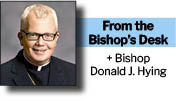
When I was in the seminary, I took an elective course on the Resurrection narratives in the Scriptures.
As we celebrate Easter, the very cornerstone of our Christian faith, I recently reread all of the Easter accounts in the four Gospels.
In Matthew, the Lord appears to the women as they leave the tomb, and then He meets the Apostles only before He ascends to Heaven, giving them the Great Commission to go forth and make disciples.
In Mark, Jesus appears to Mary Magdalene and then two disciples as they walk in the country. The apostles do not believe their testimony. Finally, the Lord appears to the Twelve, rebuking them for their lack of faith and then sending them forth to proclaim the Good News.
In Luke, we have the beloved Emmaus account and the Lord appearing to the Apostles, eating a piece of fish before them and showing forth his wounds.
In John, Peter and John run to the tomb on Easter morning after Mary Magdalene tells them the tomb is empty. Later, Jesus meets Mary Magdalene near the tomb. He appears to the Apostles in the Upper Room on Easter night, commissioning them to proclaim forgiveness and to absolve sins. We also have the beautiful narrative of doubting Thomas and the Lord encountering Simon Peter and the others at the seashore, as He famously asks three times: “Do you love me?”
He is really risen
What do these narratives tell us about the Resurrection of Jesus? Much!
They insist on the corporality of the risen Christ. Jesus is not a disembodied spirit or a figment of imagination; He shows His wounds, Thomas touches His side, He eats a piece of fish.
The risen Lord is different, however, than the earthly Jesus. He appears and disappears at will; He enters locked rooms; His best friends do not immediately recognize Him.
Both a reassuring familiarity and a mysterious transcendence mark the appearances of the Lord after the Resurrection.
This truth matters, for it shows that Jesus rose in both His Body and Spirit, thereby redeeming us in the totality of our humanity — body, soul, mind, and heart.
Another emphasis in the Easter narratives is the disbelief of the disciples.
Both Mark and Matthew make no attempt to hide the fact that, not only do the Twelve not put faith in the testimony of the women who encounter the Lord, but even have doubts when Jesus is standing right in front of them.
We can understand such doubts, given the fact that no one had ever risen from the dead before, and the Twelve were wrapped in a shroud of grief and fear.
The Gospel authors do not gloss over this lack of belief, which should give us assurance when we struggle with our own lack of faith and trust.
Only when those first followers of Jesus receive the transformative anointing of the Holy Spirit at Pentecost, will they come to full conviction in the reality of the risen Christ, boldly proclaim the Gospel, and even give their lives in witness to the truth of Easter Sunday.
What our faith is all about
The Resurrection of Jesus Christ from the dead is the cornerstone of our faith.
As St. Paul reminds us, “If Christ has not been raised, your faith is in vain; you are still in your sins. Then those who have fallen asleep in Christ have perished. If for this life only we have hoped in Christ, we are the most pitiable people of all. But now Christ has been raised from the dead, the first fruits of those who have fallen asleep.” (1 Corinthians 15: 17-19)
Because of Easter, our identity as beloved sons and daughters of the Father is restored, we have the promise of eternal life and the forgiveness of our sins. Because of Easter, our life has a supernatural purpose, meaning, and destiny.
As Christians, we can look tragedy, sorrow, grief, sin, and even death in the face, knowing that the Lord has conquered overwhelmingly and has vanquished the power of the Evil One in an absolute and lasting fashion.
I pray for everyone in our diocese as we begin the joy of the Easter season.
As we have made our pilgrim way together through the desert in these weeks of Lent, seeking to listen to the Lord’s heart, as we rest there, speaking our hearts to His, as we have practiced prayer, penance, fasting, and charity in new and deeper ways, cleansing our bodies and souls, so now we rejoice with the whole Church in the Resurrection of the Lord with minds and hearts renewed.
I encourage you to read the Easter narratives in all four Gospels.
Reflect on the details of each account. Place yourself in those wondrous encounters with Jesus. Imagine touching His side with Thomas, eating breakfast with Him on the lakeshore, seated in the Upper Room when suddenly He was there.
What does He say to you? What do you say to Him? What are you feeling and thinking in such moments?
Let His risen presence and mercy fill and expand your heart and soul.
I wish all of you a joyous and transformative Easter as we move ever deeper into the Paschal Mystery and the Pentecostal fire of the Holy Spirit!
Christ is risen!
He has risen indeed!

